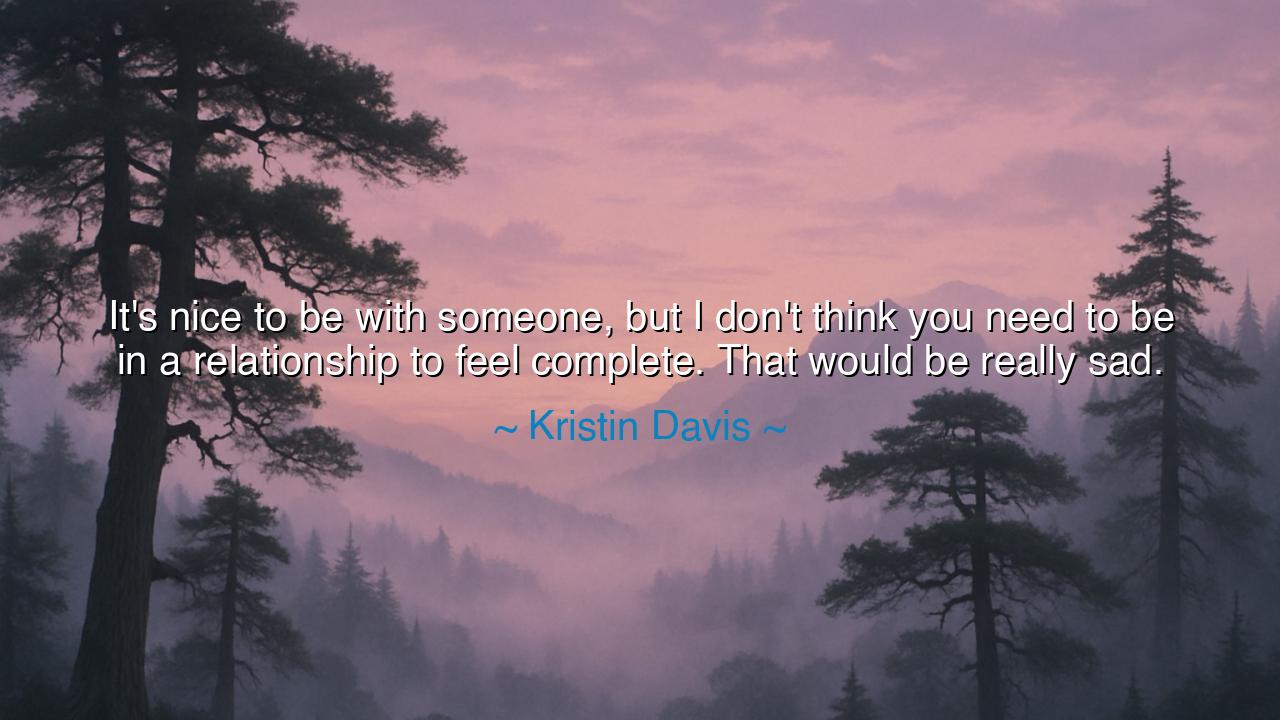
It's nice to be with someone, but I don't think you need to be in
It's nice to be with someone, but I don't think you need to be in a relationship to feel complete. That would be really sad.






Hear now the wisdom of Kristin Davis, whose words, though gentle, carry the power of liberation: “It’s nice to be with someone, but I don’t think you need to be in a relationship to feel complete. That would be really sad.” In this saying lies a teaching for all who wander through the valleys of loneliness or cling too tightly to the arms of others. It proclaims that true wholeness is not bestowed by another, but found within the sanctuary of one’s own soul.
To say it is nice to be with someone is to acknowledge the sweetness of companionship, the joy of love, the comfort of shared laughter. Yet Davis reminds us that such sweetness, while precious, must never become the foundation of our identity. For if one builds the temple of the self upon another, what shall remain when that person departs? The collapse of love would then bring the collapse of the soul itself. Thus, she declares it would be sad indeed to depend on relationship for completion, for that is to place one’s wholeness in hands not one’s own.
The ancients knew this truth. Recall the tale of Marcus Aurelius, emperor and philosopher, who bore the weight of empire yet turned often to solitude. In his Meditations, he wrote that a man’s happiness depends upon his own thoughts, not upon the favor or presence of others. Though surrounded by senators, soldiers, and family, he learned to sit with himself, complete and unshaken. His life reveals that while relationships adorn existence, they do not define its essence.
And yet, let us not despise the gift of union. For companionship, when chosen freely and not out of fear, is a noble blessing. Consider the story of Helen Keller, who, though trapped in silence and darkness, found companionship in her teacher, Anne Sullivan. Yet it was not this relationship alone that made Helen great—it was her own indomitable spirit, her inner fire, that seized learning and transformed her life. Anne was a guide, but Helen’s completion was born from within. Thus, even in friendship and love, the core of strength must come from the self.
This saying, therefore, calls us to a life of balance. Seek love, but do not crave it as though it were oxygen. Treasure union, but do not make it the measure of your worth. For a man or woman who stands whole in solitude is one who enters relationship not as a beggar seeking completion, but as a sovereign soul offering abundance. Such unions are the strongest, for they are not born of need, but of generosity.
Practical is this counsel: spend time with thyself. Learn the art of solitude, where silence becomes a friend and not a terror. Cultivate pursuits that strengthen the spirit—reading, walking, creating, serving. Ask thyself not, “Who will make me whole?” but “What can I do to discover the wholeness already within?” Then, when love comes, it will not be a crutch but a crown, not an escape from loneliness but a sharing of joy.
Therefore, O listener, engrave this truth upon your heart: completion lies not in the arms of another, but in the strength of thine own soul. Love, when it comes, is a blessing—but it must be a blessing added to what is already whole, not a patch upon a broken vessel. To depend entirely on others for meaning is to live always in fear of loss. But to find contentment within thyself is to walk free, unshaken, and strong.
So remember always the teaching of Davis: it is nice to be with someone, but not necessary to be whole. To seek love without first discovering thyself is to build upon sand; but to find love after knowing thy own worth is to build upon rock. And this is the path of wisdom, the path of joy, the path that leads not to sadness but to freedom.






AAdministratorAdministrator
Welcome, honored guests. Please leave a comment, we will respond soon